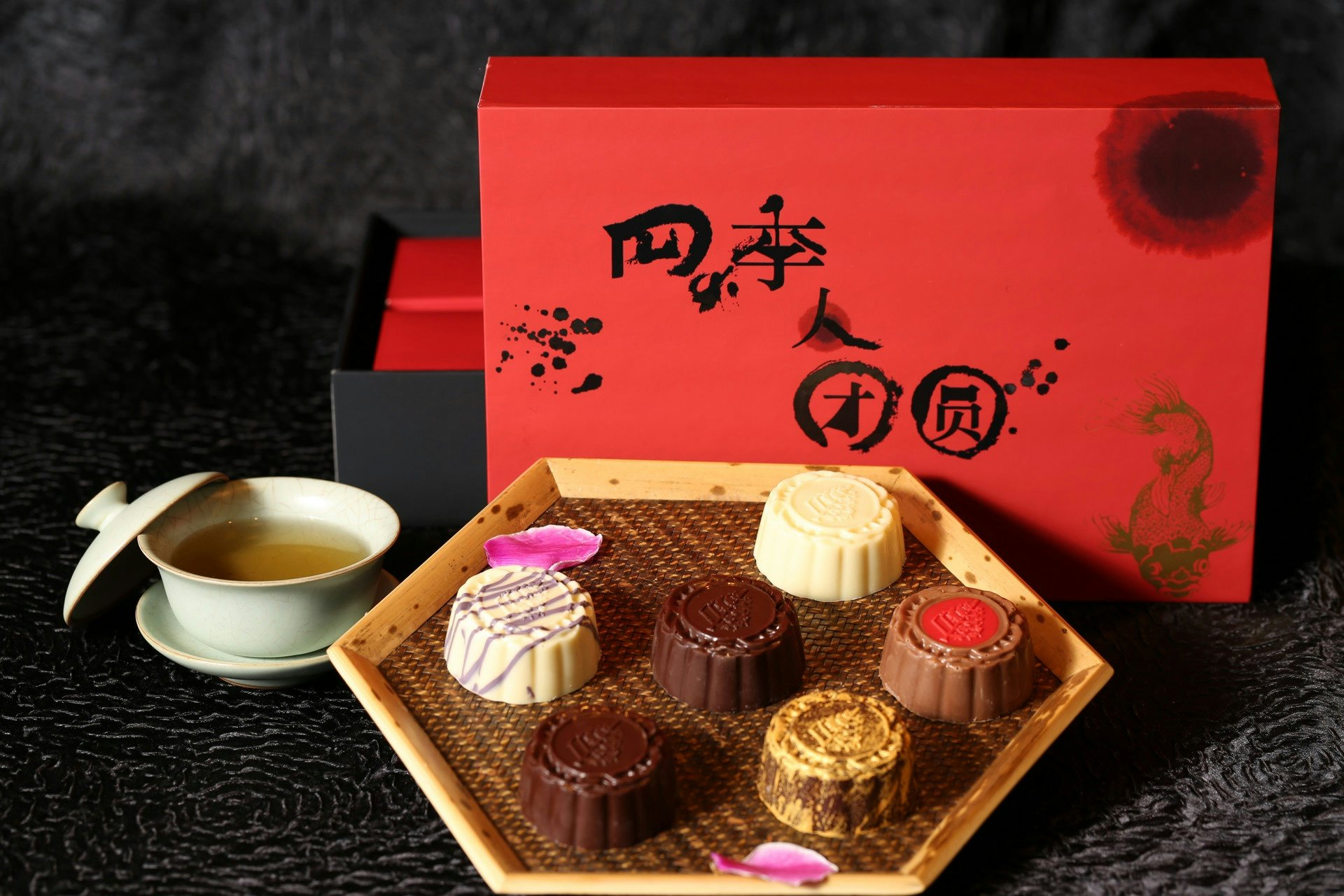This year, Chinese consumers can indulge just a little more for Mid-Autumn Festival. Traditionally a time for exchanging mooncakes filled with salted duck egg and white lotus paste, the holiday has taken a creative turn. Imported ingredients like chocolate or ice cream are no longer enough for hotel chefs—Four Seasons Beijing, for example, replaced their dark and milk chocolate fillings in their gourmet Valrhona chocolate mooncakes with ingredients that are richer and more complex: Earl Grey tea and blue flowers, matcha and raspberry, and salted caramel. Emilie Zhang, the hotel's public relations manager, said they frequently survey their clients to determine which flavors to keep and what to change out based on new trends.
Keeping consumers' taste buds happy has been especially important in recent years because people are actually eating mooncakes as opposed to gifting them as a formality or for bribery. China's anti-graft campaign has discouraged employers from using state-owned company funds for extravagant gifting expenses, such as elaborate mooncake packages which have retailed for as much as $150 per four to six cakes that are filled with delicacies like abalone and foie gras.
Since sales started suffering from China's anti-graft campaign in 2012, mooncakes have been making a vibrant comeback thanks to creative recipes and innovation. With the market left open for more unique mooncakes marketed to individuals and families, boutique bakeries have sprouted up both offline and online—throngs of chefs on Taobao sell homemade creations meant to entice buyers with exotic flavors, and five-star hotels have been jumping on the trend as well.
According to the China Daily, Shanghai's mooncake market has been experiencing a "bumper year," thanks to the innovative ingredients craze, citing The Peninsula Shanghai's new upgrade to its traditional egg custard offerings, an iced durian-filled mooncake, as well as Hotel Indigo Shanghai's wagyu marbled beef mooncakes, which sold better than its “classic” recipes. In Beijing, China World Summit Wing emphasizes online that it's featuring “new flavors” for its “glamorous” mooncake boxes, and makes a point to comment on quality and imported ingredients. Its range of mooncake packages includes red wine and yogurt flavor and a durian flavor.
Still, there are hotels committed to offering their customers reliability, like The Peninsula Hotel Beijing, which opted not to change its flavors this year. Instead, it banked on giving return customers their favorites and offered the same four packages, with their most well-known flavor being an egg custard filling, a recipe that dates back to 1986. Egg custard could arguably be considered the “original” novel mooncake—the style originated from Hong Kong as a creamy replacement for the traditional salted duck egg filling.
“Recently, mooncake sellers and hotels have offered more and more new flavors to customers, and clients have more choices,” said a Peninsula PR representative. “But at the same time, there is one kind of customer that would like to have the option of purchasing the same flavors every year. The Peninsula mooncake is well-known in the world for its original flavor, so we would like to keep it for our clients.”
The strategy seems to be working for the hotelier. This year, it had a 30 percent increase in orders and sold out of mooncakes by mid-August.
Aside from recipes, technology has also played a role in sales of the traditional treat this year. The Peninsula launched a 400-box flash sale on WeChat for the first time this season to inform more social media followers and gain new customers. Waldorf Astoria Beijing also replaced its online sales with a WeChat shop for its mooncake box and has completely sold out.
It's unclear exactly how many of these packages are being sold to employers versus individuals, but in Four Seasons Beijing's case, the Valrhona chocolate mooncakes—which are usually a favorite with corporate clients—sold out this year. Zhang said the hotel did need to reduce the number of boxes from the year before, but attributed this to difficulty in delivering large orders and preventing the chocolate from melting.
The anti-graft campaign's impact on the mooncake market is likely far from over, however. New government tax regulations went into effect in May, which prohibit hotels from issuing fapiaos, or tax receipts, for anything other than what the customer bought, Zhang said. Before this, a loophole gave hotels the option to write in a mooncake purchase as a hotel room or service. But the shift toward playing to customers' tastes for trendy, new, and unusual flavor profiles seems to be, at the very least, keeping the festival delicacy afloat.
